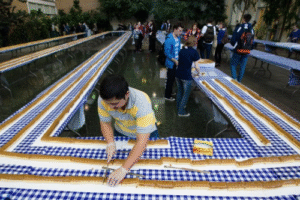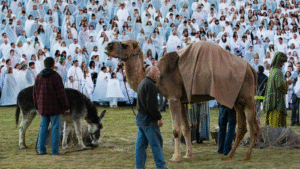Bhadohi, India’s undisputed “Carpet City,” has etched its name into the history books, earning a Guinness World Record for creating the World’s Largest Hand-Tufted Carpet. This colossal achievement underscores how the city’s centuries-old weaving traditions are not just surviving, but setting new benchmarks in global luxury and design.
The record-breaking rug, a stunning $1.4 million (approx. ₹12 Crore) project, measures an astonishing 12,464.29 square meters (over 134,000 square feet). It now graces the floor of the Grand Mosque in Astana, Kazakhstan, Central Asia’s largest mosque.
The monumental piece was crafted by over 1,000 skilled Bhadohi artisans in just six months, defying a tight deadline and the challenges posed by the COVID-19 pandemic. Featuring a majestic 70-meter central medallion and a complex Persian ‘Jannatul Firdaus’ pattern, the carpet required immense precision and was assembled in 125 coded pieces for seamless installation.
“This Guinness World Record is a powerful validation of the unique skill and dedication of our artisans,” remarked a spokesperson from the local industry. “Bhadohi’s name is now synonymous with the highest level of carpet craftsmanship in the world.”
Known as the largest hand-knotted carpet weaving hub in South Asia, Bhadohi exports a dominant share of India’s handmade rugs to the world’s most discerning luxury markets, including the U.S., Europe, and the Middle East.
Today’s Bhadohi carpets—which carry a prestigious Geographical Indication (GI) tag—are increasingly seen as far more than traditional floor coverings. They are showcased in global design magazines, luxury hotels, and high-end residences, transitioning from craft item to modern design statement. They showcase an adaptive industry that maintains its traditional hand-knotting excellence while embracing contemporary designs and ethical, sustainable production methods sought by today’s global consumer.
The record-setting feat shines a light on the vast ecosystem of 25-30 lakh people employed in the region’s carpet industry, ensuring that this living tradition continues to weave India’s cultural and economic narrative on the world stage.







